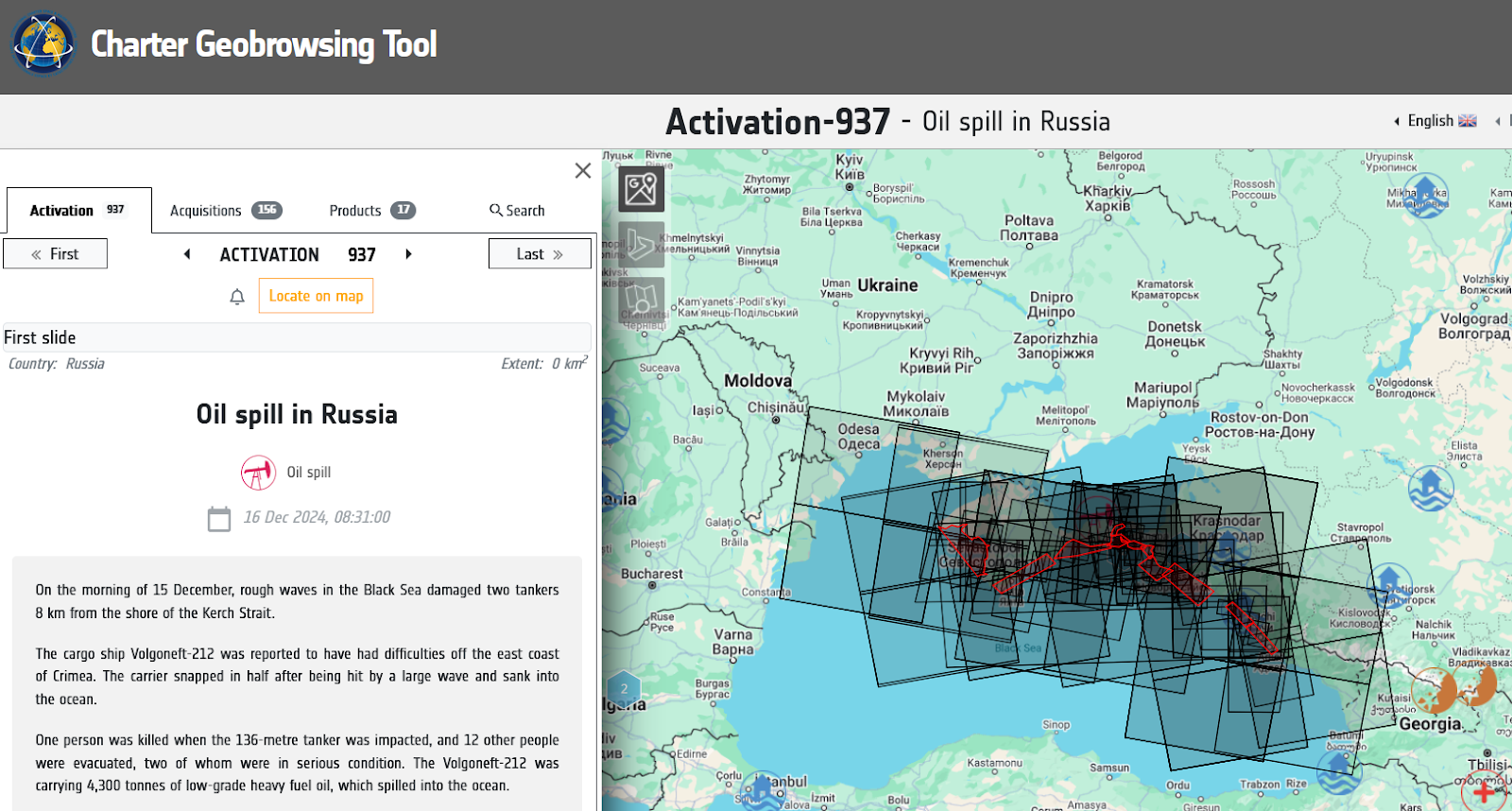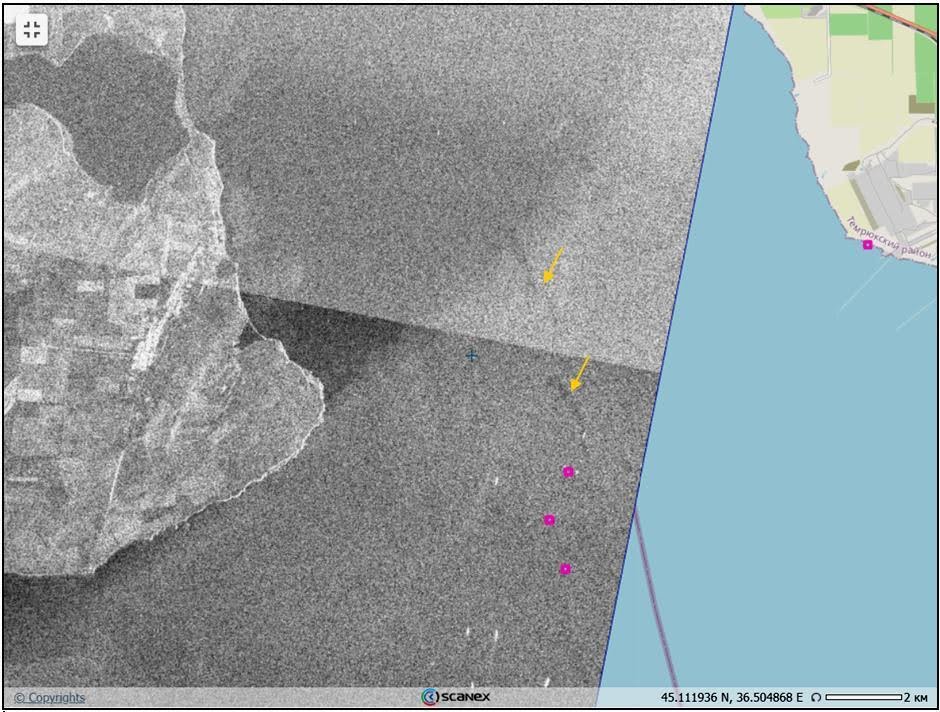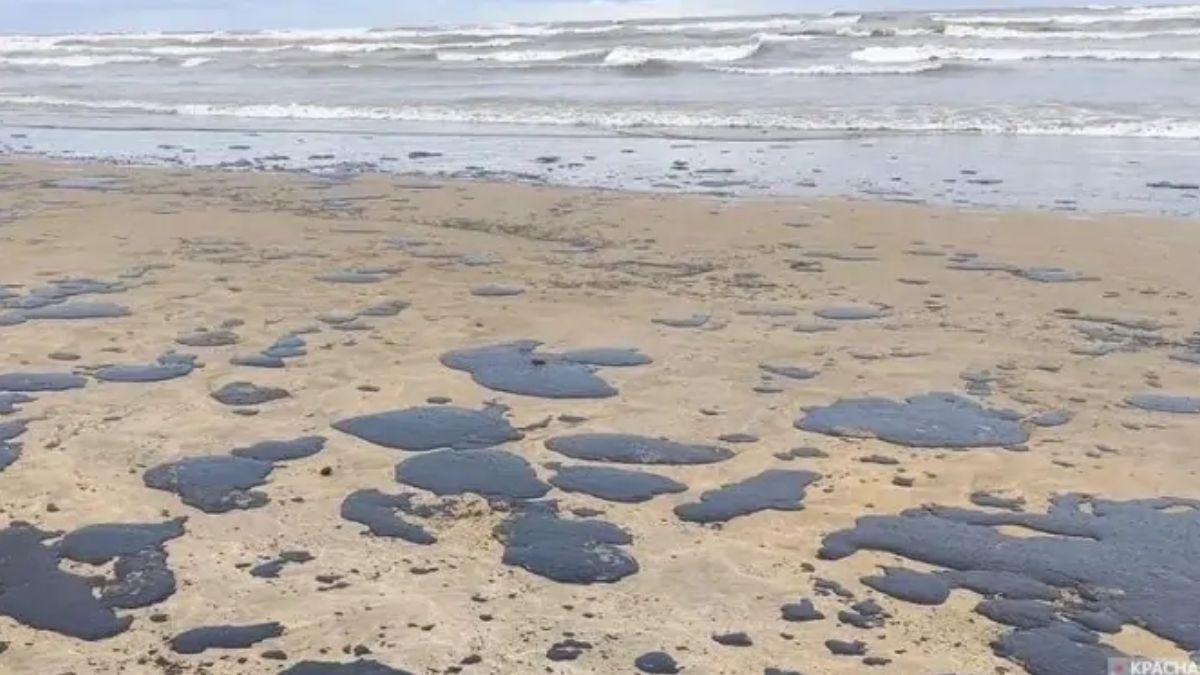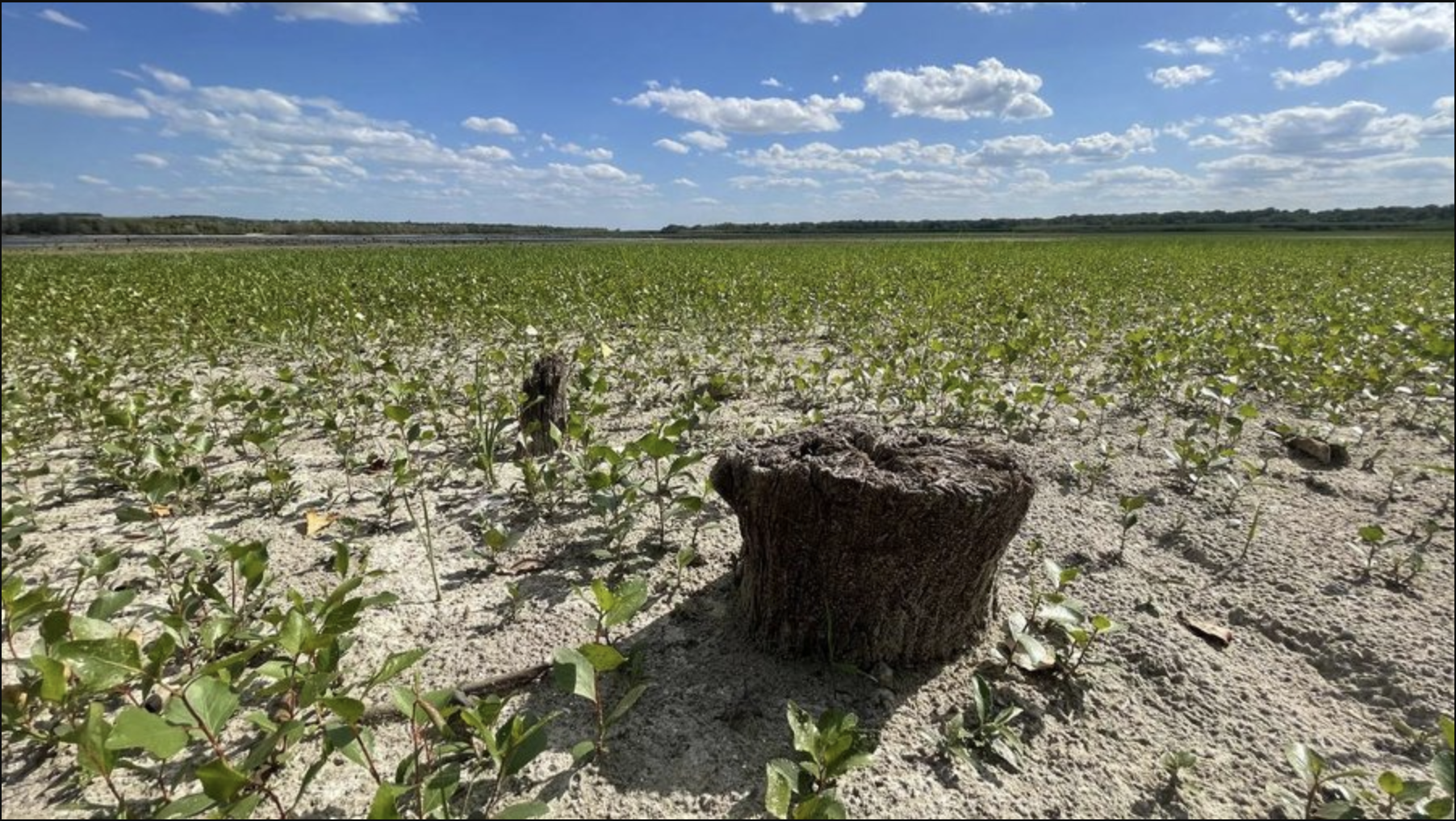Oleh Lystopad and Eugene Simonov
Although Ukraine has appealed to many international bodies to establish control over the cleanup of the catastrophic oil spill in the Kerch Strait, no significant assistance has been forthcoming. At the same time, the Russian side regularly receives international cleanup assistance. This article explores potential next steps available to Ukraine and the international community. Sanctions against Russia’s shadow fleet have become a relatively effective measure to reduce the environmental risks of oil transportation.
Ukraine demands violators be punished
Russia blocks Ukrainian and international observer access to its territories and Ukrainian territories it currently occupies, including Crimea and the Sea of Azov coastline. For now, Ukraine’s only options for assessing the scale of the tanker wreck in the Kerch Strait and tracking the effectiveness of Russian emergency response and other services in the aftermath are satellite imagery and social media.
So, following the accident on December 15, 2025, the Ministry of Environmental Protection and Natural Resources of Ukraine (commonly known as “Mindovkillya”) submitted appeals to the Black Sea Commission, the secretariats of UN conventions UNEP, UNESCO, the European Union and the International Maritime Organization (IMO). The newspaper “Svit” received these letters from the ministry and published excerpts, provided below.
The Ministry’s appeals note that “the incident occurred due to the Russian side’s failure to comply with technical requirements for navigation safety, in particular, the use of river vessels on high seas in stormy weather. This situation reflects a broader trend of the Russian Federation’s failure to comply with international safety standards, typical behavior for an aggressor state.”
Mindovkillya Minister Svetlana Grinchuk, who signed the appeals, also insisted that “the incident requires increased international oversight of compliance with maritime safety standards and increased pressure on the Russian Federation to prevent further pollution of the marine environment. In addition, it is imperative that Russia be held accountable and be obliged to compensate for the damage caused to the environment.” To this end, Ukraine demanded that a meeting of the Black Sea Commission be convened.
The Black Sea Commission is an intergovernmental body for the implementation of the Convention on the Protection of the Black Sea from Pollution (Bucharest Convention), its Protocols and the Strategic Action Plan for the Restoration and Protection of the Black Sea. The convention was signed in 1992 by representatives of Bulgaria, Georgia, Russia, Turkey, Romania and Ukraine. In October 2024, Ukraine blocked transfer of the chairmanship of this convention’s secretariat to the Russian Federation.
Ukraine’s Mindovkillya also had demands for the International Maritime Organization:
- “Initiate an international assessment to determine the extent of damage caused to the Black Sea marine environment as a result of the fuel oil spill.
- Promote measures to strengthen international oversight of compliance with environmental standards for maritime transport and technical requirements for ships.
- Support efforts to restore the marine ecosystems affected by this pollution in cooperation with relevant regional organizations.
- Formally condemn the Russian Federation’s actions that contradict its international environmental obligations.”
The IMO is a specialized intergovernmental agency of the United Nations responsible for setting global standards for shipping safety, preventing pollution from ships and promoting the efficiency of international maritime transport.
The Minister of Mindovkillya also held a number of bilateral meetings, including with Türkiye’s Ambassador to Ukraine Mustafa Levent Bilgen. The Turkish Ambassador confirmed that he supports Ukraine’s initiatives and will inform the Turkish side about the accident’s consequences and Mindovkillya’s position.
However, despite these statements, no restrictions followed on the passage of old Russian ships through the Black Sea’s western straits controlled by Türkiye. No experts from Türkiye qualified to assess the damage caused to the Black Sea spoke out about the disaster. No statements, demands, or claims were made.
More about the catastrophe: Military oil spill: How the Kerch Strait tanker disaster is linked to Russia’s ‘shadow fleet’ oil exports
International institutions slow to aid
On January 31, an extraordinary 45th meeting of the Black Sea Commission, convened at Ukraine’s request, was held with the participation of representatives from Romania, Bulgaria, Turkey, Georgia, Ukraine, and Russia. The Ukrainian delegation attended the meeting led by Mindovkillya Minister Svetlana Hrinchuk.
The Ministry reported the results of this meeting on its website: “After four hours of discussion, the parties failed to reach a consensus on the final resolution. Realizing that the Commission would inevitably recognize that Russia violates the Federation’s requirements of Articles 3 and 4 of the Protocol, representatives of the aggressor country resorted to their usual tactics of manipulation and distortion of facts, trying to impose their own interpretation of events, rules and procedures. The results of this meeting once again demonstrated institutional problems in the Commission’s work. Ukraine has repeatedly drawn attention to this fact in the past.”
In other words, the meeting failed to produce any results.
The 12th meeting of the IMO’s Pollution Prevention and Response (PPR) Subcommittee took place January 27-31, 2025.
Chaired by Finland’s representative, the session was attended by delegations from IMO member and associate member governments, representatives of UN programs, specialized agencies and other intergovernmental observers.
“During the subcommittee session, one of the key items on the agenda was the discussion of the consequences of the fuel oil spill near the Kerch Strait in the Black Sea. Ukraine’s delegation released a statement on the incident, noting that:
- Widespread negative environmental impacts resulted from the fuel oil spill, with over 700 seabirds and 61 dolphins killed as a result of direct exposure to toxic fuel oil.
- These incidents are a violation of international law, as the Russian Federation permitted the use of vessels unfit for maritime operations and refused to notify Ukraine of the pollution incident,” Mindovkillya’s press office reported.
At the same time, it was noted that member states should strengthen measures to combat the “shadow fleet” and ensure compliance with IMO Resolution A.1192(33), calling on member states and all relevant stakeholders to cooperate in actions to prevent illegal operations of the “shadow fleet” at sea.
During the PPR Subcommittee’s meeting, Ukraine was supported by delegations from Australia, Canada, Japan, Norway, Poland (on behalf of all EU member states and the European Commission), Great Britain and the United States.
Despite that support, no general resolution was adopted which would require Russia to scrap dangerous vessels and ban countries from purchasing oil delivered using those vessels. Nor was there a demand to allow international experts to travel to the polluted coastline and sea areas to assess the damage, etc.
Also at the end of January, Mindovkillya received a response from the United Nations Environment Program (UNEP).
“On the eve of the UN Ocean Conference, UNEP is ready to provide Ukraine with technical assistance in assessing the damage this disaster caused to the Black Sea ecosystem. This will be an important step in overcoming the consequences of the accident,” the Ministry’s press service highlighted the response’s points.
The UNEP also emphasizes that this work should be carried out in close cooperation with the Black Sea Commission, which has the relevant mandate. In addition, the UNEP Secretariat is prepared to cooperate with the IMO to strengthen international control of environmental standards compliance for sea vessels. In other words, with the same Black Sea Commission and the same IMO that have already demonstrated their inability to adopt effective decisions and measures.
There is no publicly available information about any further assistance from UNEP, while in 2007 the agency played a key role in analyzing the consequences for Ukraine of a similar oil spill committed by the Russians.
Meanwhile, Russia receives international aid
The very next day after the disaster, Russia promptly requested international assistance in obtaining remote sensing data using the “International Charter: Space and Major Disasters” framework. This assistance was immediately provided by the space agencies of half a dozen “unfriendly countries” that published daily information between December 17, 2023 and February 7, 2024 on a special website about the consequences of the fuel oil spill in the Black Sea (the specific page with these materials on their site is now unavailable). On the Charter’s website, the disaster was simply called “Oil spill in Russia” despite the obvious fact that at least half of the pollution was observed directly in occupied lands belonging to Ukraine.

More on the impacted areas: Military oil spill (2): Scale and consequences of the catastrophe for flora and fauna and the region’s ecosystems
According to Deputy Director for Science at the Ukrainian Institute of Hydrometeorology Yuriy Ilyin, international cooperation in the Black Sea after Crimea’s occupation was partially paralyzed. Consequently, monitoring carried out by international organizations was also disrupted. This freeze conveniently enables international entities to view this incident as a domestic issue in Russia, unrelated to the war and occupation.
In April 2025, oil leaks from the wreckage in Ukrainian territorial waters were again visible on satellite images. Russia is planning a highly questionable operation to create sarcophagus-cofferdams to isolate the three pieces of tankers in shallow waters, then extract the oil products, and then raise the remains of the ships together with the cofferdams as early as 2026. There are very few successful precedents for such operations anywhere in the world. There are many more successful examples of pumping out the oil without constructing additional casing, but their design and implementation is less expensive, while the Russian government prefers to conduct oil spill cleanup using the most capital-intensive methods. The operation to design, manufacture and install cofferdams alone will cost more than 100 million US dollars. In any case, the adopted plan assumes that fragments of the disintegrating tankers full of oil products will continue to threaten further oil spills until at least 2026. The absence of any international monitoring mechanism or even an assessment of this plan by independent international experts is of great concern.

As one of 126 member countries today, Russia can also seek international insurance payments from the International Oil Pollution Compensation Fund (IOPC Fund). During a Fund meeting in late April, a special document on the prospects for paying compensation was considered under the heading “Incidents in the Russian Federation.” The document discusses a spill in the “Kerch Strait, Anapa and Temryuk regions of the Russian Federation” and notes that in January 2025 “oil pollution was also noted in Sevastopol on the Crimean Peninsula.” The country in which the peninsula is located is tactfully left unnamed. The Fund Director “held informal discussions” with the Russian delegation, while the Fund “has yet to receive a formal request for assistance from the Russian Federation.” The document also states that, according to the Fund’s rules, the civil liability limit for a spill for convention participants is 4.51 million conventional units (around 6 million US dollars), and the liability limit, as a portion of the Fund’s resources, is 203 million conventional units (280 million US dollars). (That is, the Russian party responsible for the accident will pay 6 million, and the international insurance fund will add 274 million dollars).
Rosprirodnadzor has already declared damages in the amount of one billion US dollars, and additional funds to compensate for cleanup costs will be claimed through the courts by local municipalities and the Russian Marine Rescue Service. These expenses do not include the highly costly operation with cofferdams. Russia could potentially collect roughly 270 million dollars in IOPC funds for polluting Ukrainian waters and the shores of occupied Crimea.
What is Ukraine to do?
Just two days after the accident on December 17, Ukraine’s Minister of Environmental Protection said that the damage from the accident exceeded 14 billion US dollars and the country will try to force the Russian Federation to compensate Ukraine. In the current situation, it is unclear how this compensation could be achieved.
“Ukraine should not only address this situation more actively, but it should also consistently and systematically seek to take action. Specifically by investigating companies that buy oil and demanding that the EU tighten sanctions,” former head of the Verkhovna Rada Committee on Foreign Affairs Anna Hopko told Svit. “Then we need to contact each of the democratic member states of the UN Security Council with proposals to consider this issue… This should be done via the Ministry of Foreign Affairs, using its full potential, one which is much stronger than Mindovkillya’s influence at the international level. The Committee on Environmental Policy and the Committee on Foreign Policy of the Verkhovna Rada of Ukraine should also have their say.”
Under international law, Russia’s pollution of the Black Sea is not considered the result of military action. Therefore, Directive 2004/35/EC of the European Parliament and of the Council on environmental liability for the prevention and remedying of environmental damage should come into play.
“The purpose of the Directive is to establish limits on environmental liability. These limits are based on the ‘polluter pays’ principle,” notes a study by the NGO Ecology-People-Law (EPL).
EPL experts write that this directive applies when damage is caused to protected species and habitats, water resources or soil.
The following expenses are subject to compensation: damage assessment, data collection, implementation of preventive and recovery measures; and administrative, judicial and enforcement costs, including oversight and monitoring.
The Black Sea spill falls precisely under this directive. The issue is that there are many discrepancies in Ukrainian law as it relates to the directive. Much work needs to be done in order for Ukraine to speak the same “language” as Europeans. Either a special law must be adopted or changes need to be made to the framework law (“On Environmental Protection”) as well as in other regulatory acts.
“In order to count on compensation for environmental damage, our methods of calculating damage must comply with best international practices,” says international environmental management expert Andrey Demidenko. “Ukraine’s approaches to assessing damage must be reformed in order to adopt such ‘best international practices’. Because Soviet-era evaluation of environmental damage remains in practice here, a process where law-breaking damages the state and not the environment or ecosystems. Such practice is corrupt by design. The government can change the assessment of the amount of environmental damage hundreds of times with a single decision. Of course, no sane international court will recognize this.”
Even the best-calculated damage will be difficult to recover without an international investigation of all the mechanisms that caused it as a means of showing that it is the fault of the Russian Federation and not a force majeure. An investigation into the disaster’s causes will also help to determine measures to prevent such accidents in the future. To do this, Ukraine (or an international body conducting the investigation) should not only use satellite imagery, but also request the results of all of Russia’s ongoing investigations and inspections regarding the state of the country’s shipping fleet.
Carried out without external monitoring, the results of the Russian Federation’s oversight activities raise questions. After inspecting 1,333 small tankers, Russia announced in early May 2025 that it had prohibited the use of just 29 of them. Given the retirement age and the state of the fleet, such a cosmetic half-measure raises concerns that the tragedy could reoccur in the near future. Russia is also threatening to conduct safety inspections of 139 of its own large tankers with capacity of over 5,000 metric tons, but clearly does not intend to do the same with the 1,000 “shadow fleet” vessels under its control while sailing under foreign flags.
Ukraine also needs to finalize and adopt (or rewrite) its law on state environmental oversight and the law on the Emerald Network, both of which have been stuck in the Verkhovna Rada for four years. It must also adopt a number of other laws and subordinate laws to enable more accurate assessment of environmental damage. In particular, the “Procedure for Monitoring Biological and Landscape Diversity,” which was recently approved by the Cabinet of Ministers of Ukraine, requires improvement. This work cannot wait for the war to end, as suggested by a resolution of the Cabinet of Ministers; implementation should begin immediately.
Sanctions as a tool of wartime environmental policy
In a conversation with the Prime Minister of the United Kingdom on December 23, Ukrainian President Volodymyr Zelensky outlined the priorities of fighting both pollution and Russia’s financing of the war: “… we discussed the pressure on Russia because of the war, and that we especially value sanctions against Russian tankers and the shadow fleet that finances the war. All such tankers should be sanctioned, and it is not only European ports that need protection from them. Everyone sees the consequences of the disaster in the Black Sea—fuel oil polluting the coast. Russia uses very old ships, 50 years old, anything it can to make money. This is a full-scale threat both in terms of financing the war and in terms of harm to nature. Not a single sea in the world deserves all this damage created by Russia’s actions,” Zelensky said.
Indeed, work in the months of December through February resulted in sanctions imposed by the UK, US and EU on member-vessels in Russia’s “shadow fleet”. Up to 45% of those ships were decommissioned and replaced with more reliable and less dangerous tankers covered by Western insurance policies, mainly transporting oil under contracts that comply with the price cap of $60 per barrel for Russian oil. The risk of accidents with oil spills decreased, as did the Russian Federation’s income from oil sales. Thanks to the tariff war unleashed by Trump, by April the international price of oil itself fell below the sanctions price cap, which made almost any transportation of Russian oil “unpunishable” and created more incentives for its transportation by non-shadow vessels.
On May 6, 2025, the International Working Group on Russian Sanctions published “Sanctions Plan No. 4” on the Stanford University website, in which it recommended the following measures for G7 countries and their allies:
– Impose sanctions on the majority of shadow fleet vessels not yet affected by them in order to finally shift the balance in favor of “legal” tankers insured by reputable Western associations;
– Sanction all Russian oil and gas companies and organizations that in any way enable Russian oil exports to bypass the price cap (for example, using non-Western insurers);
– Lower the price cap on Russian oil and fuel oil a further 15 US dollars;
– Add premium surcharges to tariffs on the transportation of Russian oil by “Western” tankers and transfer that revenue to the Ukrainian assistance fund;
– Sanction Russia’s non-oil loading terminals instead of adding companies to the sanctions list. Given that export volume is determined by the capacity of the Russian Federation’s 18 main port terminals, such a scheme is no less effective and its implementation is easier to monitor.
Overall, the sanctions working group believes that summer-autumn 2025 is the best time to apply sanctions-based economic pressure on Russia as leverage to force the country to agree to a full ceasefire and ultimately a just peace agreement.
The European Union and the United Kingdom are seriously considering maximally tightening sanctions related to the trade in Russian oil. It also seems that they have heard the sanctions working group’s recommendations. On May 9, the United Kingdom added another 110 shadow fleet tankers to the sanctions list. Russian companies trying to insure shadow fleet vessels with policies that purportedly meet international standards were also sanctioned. On May 20, the list was supplemented with yet another 14 tankers and one British citizen, John Michael Ormerod, who was caught organizing the sale of 25 old tankers to meet Russia’s needs.
On May 20, the EU used its 17th sanctions package to sanction another 190 tankers and Russian insurer VSK and Dubai-based Eiger Shipping, as well as companies in Turkey, the UAE, Hong Kong and Vietnam that facilitate shadow fleet operations. In total, 342 tankers are currently under EU sanctions.
According to Lloyd’s List Intelligence, as of May 21, 2025, more than 700 vessels—10% of the world’s tanker fleet—are currently under anti-Russian sanctions.
Announcing the new sanctions, EU foreign policy chief Kaja Kallas stressed that since the EU introduced oil price caps and sanctions on the shadow fleet, Russia’s corresponding revenues have fallen by 38 billion euros (42.8 billion US dollars). Russia’s revenues in March 2025 were 13.7% lower than in March 2023 and 20.3% lower than in March 2022.
At the same time, European officials increasingly justify sanctions not by compliance with the oil price cap, but as combating violations of shipping rules and the environmental safety of oil transportation. However, sanctioned tankers are still permitted to sail European waters. The European Commission previously required that all tankers in EU waters provide proof of reliable insurance, but the means of forcing them to do so are limited.
At the next G7 meeting, European officials are preparing to discuss further lowering of the price cap on Russian oil from $60 to $50 per barrel, likely as an element of the 18th sanctions package.
Earlier, the US Congress prepared similar measures to increase sanctions, but after Trump lost interest in forcing Russia to implement a ceasefire in Ukraine, their introduction is uncertain. Some analysts believe that without US participation, Europe will be unable to effectively enforce its own sanctions.
***
It is unsurprising, although quite unfortunate, that international environmental protection mechanisms that are not always effective in times of peace have largely ceased to function in wartime—at least as it regards the pollution of international waters in the Black and Azov Seas. This is partly due to desperate geopolitical competition/polarization in all international institutions, and partly due to the inability of Ukraine’s government and civil society to pay sufficient attention to these complex “non-military” international environmental mechanisms in the midst of a war.
Today, the most dynamically developing mechanisms are “dual-use”, aimed firstly at reducing Russia’s ability to finance the war, and secondly at reducing the risk of oil spills. While earlier sanctions packages and the price cap did not account for potential environmental consequences, partly contributing to the growth of the shadow fleet and its associated environmental risks, recent new sanctions often include more obvious environmental precautions. In addition, increased attention to the shadow fleet’s real risks following the Kerch Strait disaster has energized the development of effective mechanisms that force all vessels, regardless of jurisdiction and actual affiliation, to comply with basic environmental safety measures during maritime transportation, and it is likely that these mechanisms will probably continue to improve after the war.
Written by Eugene Simonov, UWEC Expert, and Oleh Listopad, National Interests Advocacy Network
Translated by Jennifer Castner
Main image source: 24tv.ua







